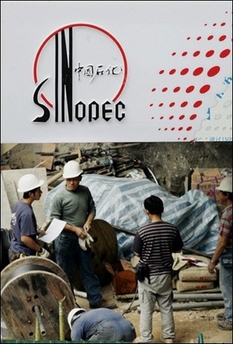China has approved a
five-billion-dollar domestic oil refinery joint venture with Kuwait, marking
another major development in the Asian nation's quest for energy.
The project, between China's Sinopec and Kuwait Petroleum Corp., will become
the biggest Sino-foreign joint venture in the petrochemical industry, according
to the Shanghai Securities News Thursday.
|

This file photo shows workers standing next to
a Sinopec logo in Hong Kong. The Chinese government has approved a
five-billion-dollar domestic oil refinery joint venture between China's
Sinopec and Kuwait Petroleum Corp.
[AFP]
|
The giant operation will be located near the city of Nansha in south China's
Guangdong province, a part of China where long lines at the gas stations have
come to symbolize the nation's great need for oil.
"Guangdong province is a major consumer of gas and diesel, and supply is
simply not ample enough," said Qiu Xiaofeng, a Shanghai-based oil analyst with
Everbright Securities.
China, the world's second-biggest oil consumer after the United States, used
about 318 million tons of oil last year, of which 40 percent was imported,
according to earlier reports.
The facility, which is scheduled for completion in 2010, will include an oil
refinery with a 15-million-ton annual capacity and a plant capable of producing
one million tons of ethylene a year, the Shanghai Securities News said.
Earlier reports said the ethylene facility in itself would become the largest
ethylene plant in China.
Chinese demand for ethylene -- a key component in the manufacturing of many
plastics products -- has risen dramatically in the course of its economic boom.
The country had to import 57 percent of its ethylene needs last year, up from
just 22 percent in 1990, the Shanghai Daily reported.
Qiu said the venture would also enable Kuwait to get a better understanding
of movements in a market that has risen drastically in importance, with China
now the world's fourth-largest economy.
"The Kuwaiti investment in downstream facilities puts them directly in touch
with the markets, enabling them to continuously provide feedback back home on
overseas needs," said Qiu.